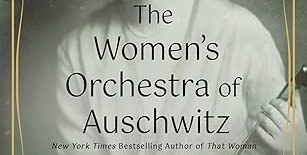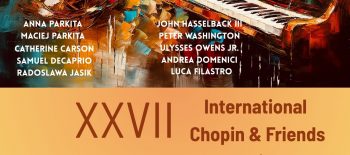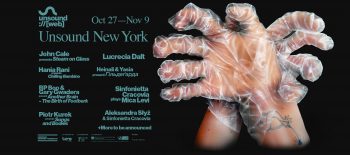“Not many solo recitals are as eclectic as this…She’s a musical chameleon, quickly getting under the skin of whatever she’s playing” Graham Rickson, The Arts Desk
Tuesday, May 30, 2023 at 8pm ET
Weill Recital Hall at Carnegie Hall
57th St & 7th Ave, New York, NY
Special Discount Tickets: $28.77 instead of $59
Students & Seniors: $20 at the box office only
Regular Tickets
Creative Classical Concert Management presents the Carnegie Hall debut of award-winning Polish violinist Magdalena Filipczak on Tuesday, May 30th at 8pm in Carnegie Hall’s Weill Recital Hall. The program is inspired by the phantasy motif, including Phantasies by Schubert, Wieniawski and Schönberg. Filipczak showcases selections from her debut album, Essence of Violin, including works by Lutosławski, Britten, and Saint-Saëns/Ysaÿe. Cherchant, composed by Stephen Coxe and dedicated to Magdalena Filipczak, will receive its world premiere.
Magdalena will be performing with accomplished American pianist Jessica Xylina Osborne on a fine Francesco Rugeri violin kindly loaned to her through the Beare’s International Violin Society by a generous sponsor. Support provided by the Polish Cultural Institute New York.
Program
LUTOSŁAWSKI Subito (1992)
SCHÖNBERG Phantasy for Violin with Piano Accompaniment, Op. 47 (1949)
SCHUBERT Fantasia in C major for Violin and Piano, Op. posth. 159, D. 934 (1827)
Intermission
BRITTEN Reveille: a Concert Study for Violin and Piano (1937)
WIENIAWSKI Fantaisie Brillante on motifs from Opera Faust by Charles Gounod, Op. 20 (1865)
STEPHEN COXE Cherchant (2019) for Magdalena Filipczak World Premiere
YSAŸE Caprice d’après l’Étude en forme de valse de Saint-Saëns (1901)
“Performance full of humanity and empathy”—George Grella, New York Classical Review
“Virtuosic music making of the highest order”—Dave Robson, The Darlington and Stockton Times
“She played with poise and eloquent expression”—Colin Anderson, ClassicalSource.com
Notes on the Program by Magdalena Filipczak
The opening of the recital starts with a Polish musical accent which has an American element at its origin. The American violinist Joseph Gingold commissioned Witold Lutosławski to compose Subito as a compulsory piece for the International Violin Competition of Indianapolis in 1994. It is one of the last works completed by the composer. Subito written in the rondo form contrasts virtuosic and abrupt elements of the refrain with mysterious and unsettling episodes. There are also elements of diabolic scherzos. Every section is characterised by unexpected twists and turns.
Schönberg’s Phantasy (1949) represents twelve-tone serialism technique, a method of composing invented by the composer. It is the last instrumental piece of Schönberg and it was dedicated in the memory of violinist Adolph Koldofsky. In the process of composing Schönberg wrote first the solo violin line and then added the piano accompaniment to go with it. The opening gesture of the violin part prevails in this musically theatrical piece which portrays the late romantic, decadent atmosphere.Schoenberg marks the score with detailed indications regarding various tempos, dynamic and romantic expressive indications, such as passionato, dolce, cantabile, grazioso, and furioso. The parts marked Scherzo are reminiscent of a mischievous, Viennese waltz.
Schubert’s Fantasia, written towards the end of composer’s short life, was inspired by Paganini’s virtuosity, and Schubert’s own song Sei mir gegrüßt, sei mir geküßt – “Let me greet you, let me kiss you.” The Fantasy is written in one movement. However, due to the changing musical narrative, quite distinct parts can be distinguished in it. It opens with a soulful introduction in C major which contrasts with the following Hungarian like dance in A minor. Next, the melody of the aforementioned song constitutes the heart of this piece, and is the theme of a set of variations in A flat major. After the variations the material from the introduction brings back the key of C major, which is underlined by a triumphant and lively finale.
Benjamin Britten’s Reveille was written by the composer as a kind of musical joke and a gift dedicated to a violin virtuoso, Antonio Brosa. Brosa was Britten’s friend and a music collaborator who had problems with waking up in the morning and thus with early practising. The French word used for the title means “waking up.” Britten created for Brosa a concert study that musically imitates a sleepy virtuoso warming up on the violin, going step by step from lazy changes of positions into more complicated elements of the violin technique. The repetitive accompanying piano part, of a bass-ostinato character, plays the role of the clock.
In Wieniawski’s time virtuosic variations and paraphrases on popular operas were often included in concert programs to attract audiences. Gounod’s Faust opera, full of tuneful melodies and action, inspired Wieniawski to create his Fantaisie Brillante in one movement, which has five easily distinguishable parts. Wieniawski chose the most attractive tunes amongst which is the melody from Méphistophélès’s aria about the greed of man, as well as the waltz from the second act, which constitutes the finale of the Fantasy.
American composer Stephen Coxe has written Cherchant – Searching for Magdalena Filipczak’s Carnegie Hall debut. The piece is inspired by the overall, fantasy character of the whole recital program. It alludes to Fantasies of Schönberg, Schubert as well as Ravel’s Sonata which Magdalena recently recorded for her album with a renowned Hungarian pianist Peter Frankl. The opening of the piece brings a clear reference to the Violin Concerto by Schönberg’s student Alban Berg. It contains similar tempo indications to Schönberg’s Phantasy.
Caprice d’après l’Étude en forme de valse – Etude in a form of waltz by Camille Saint-Saëns – full of delight and virtuosic fireworks finishes the program of the recital. The Caprice was originally written for solo piano and arranged for violin with piano accompaniment by Belgian violin virtuoso and composer Eugene Ysaÿe. Saint-Saëns was so content with the arrangement that he included it in his own catalog of works.
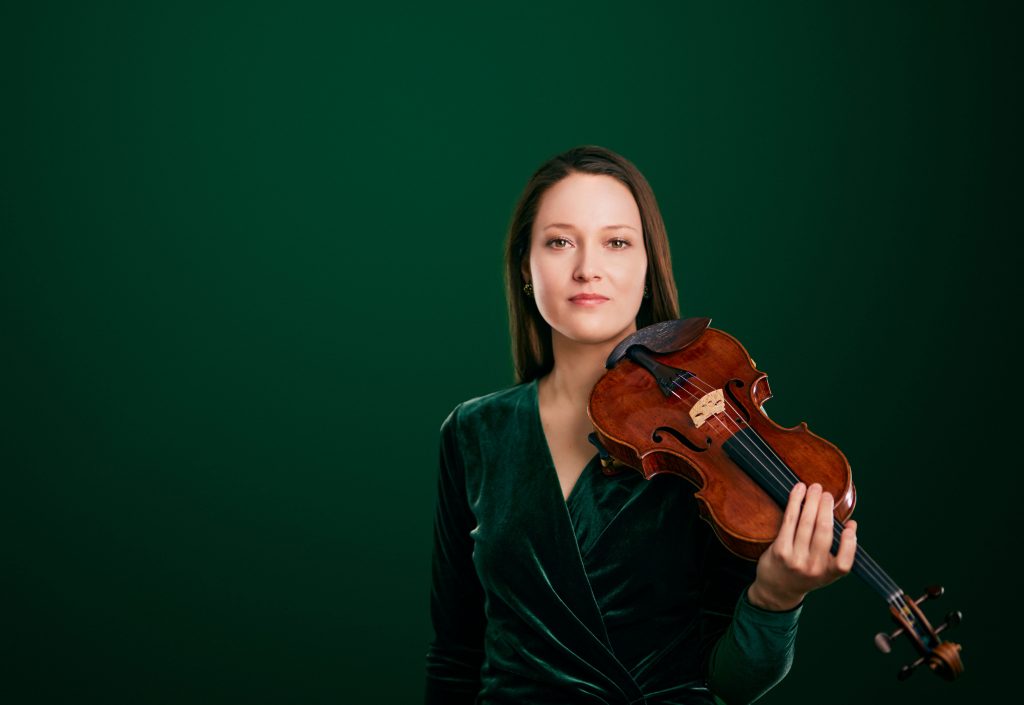
About Magdalena Filipczak, Violinist
“She is a musical chameleon, quickly getting under the skin of whatever she’s playing” wrote The ARTS DESK about award-winning Polish violinist Magdalena Filipczak. With her eclectic and extensive repertoire she has appeared as a soloist and chamber musician in the UK (including Wigmore Hall, Barbican Hall, St John’s Smith Square), in Europe (among others in Het Concertgebouw, Tallinn Philharmonic, Cracow Philharmonic, Baltic Philharmonic) as well as in the USA, Canada and South America.
Among her many international competition successes, she is the winner of the IV Heino Eller International Violin Competition in Estonia and recipient of special prizes for the best interpretation of Bach (Bärenreiter Edition Prize) and the best concerto performance (Music Academy in Tallinn Prize). Most recently Magdalena has received the Gold Prize of the 2018 Manhattan International Music Competition, the Silver Prize at the 2018 Berliner International Music Competition, and First Prize at the 2017 United States International Concerto Competition. For her achievement she was awarded Młoda Polska Scholarship (Young Poland) by the Polish Ministry of Culture and National Heritage.
Magdalena’s new CD with renowned Hungarian pianist Peter Frankl is in the final stage of postproduction. Her solo debut CD, Essence of Violin, has been praised by critics, including The Strad as “glittering…beguiling…captivating…hauntingly atmospheric…” Recently she has been releasing on YouTube her new recordings with her brother, pianist Lukasz Filipczak. Magdalena is also featured in two discs recorded with Gruppo Montebello at the Banff Arts Centre in Canada, two CDs with music by GRAMMY Award-winning composer Tim Garland: Songs to the North Sky and Weather Walker, and two CDs with music by Peter Gregson: Quartets: One and Quartets: Two. Media appearances include BBC Radio 3, Chicago’s WFMT Radio, Dutch Radio 4, Canadian Radio, Bulgarian TV, Polish, Austrian and Estonian TV and Radio. Magdalena also toured Brazil and Argentina as a guest leader/director with the Tallinn Chamber Orchestra.
After graduating from the Guildhall School of Music and Drama in London, where she studied with the distinguished Polish violinist Krzysztof Smietana, she was awarded an Individual Artist’s Fellowship. At the Guildhall she won the Max and Peggy Morgan Violin Concerto Prize, and together with her brother, pianist Łukasz Filipczak, Ivan Sutton Chamber Music Award of the City Music Society in London. Magdalena also trained voice at the Guildhall with John Evans and later she had private lessons with Benita Valente in America. Currently she is a recipient of the prestigious Fellowship Award of CUNY Graduate Center in New York for Doctoral Studies in Music Performance. During DMA she was mentored by Daniel Phillips and Donald Weilerstein on the violin, and additionally she trained voice with Robert White.
Magdalena was one of the Holland Music Sessions’ New Masters on Tour, and she was admitted to and performed at American music training programs, including the Itzhak Perlman Chamber Music Program and Residencies, Yellow Barn, Norfolk Festival, as well as Krzyżowa-Music in Poland, and IMS Prussia Cove in the UK. Magdalena has been awarded scholarships from the Musicians’ Benevolent Fund, the Philharmonia Orchestra/Martin Musical Scholarship Fund, the Craxton Memorial Trust, the City of London Corporation, the Derek Butler Trust, the Wolfson Foundation, the English Speaking Union, the Norfolk Festival/Yale Summer Music School Fellowship, the Fishmongers’ Company, the Solti Foundation and the Zetland Foundation.
She has given masterclasses in Brazil, Yellow Barn’s Young Artists Program, and through Itzhak Perlman’s Music Residencies in America. Currently Magdalena is an Adjunct Professor at the Aaron Copland School of Music (Queens College) in New York.
Since 2019 she is supported by the Beare’s International Violin Society in London which kindly loans Magdalena some of the finest instruments, including violins by Stradivarius, Nicolo Amati, Guadagnini or Peter Guarneri. For her Carnegie Hall debut, Magdalena will play a fine Francesco Rugeri violin, kindly loaned to her through the Beare’s International Violin Society by a generous sponsor.
Photos: Magdalena Filipczak by Krystian Data.
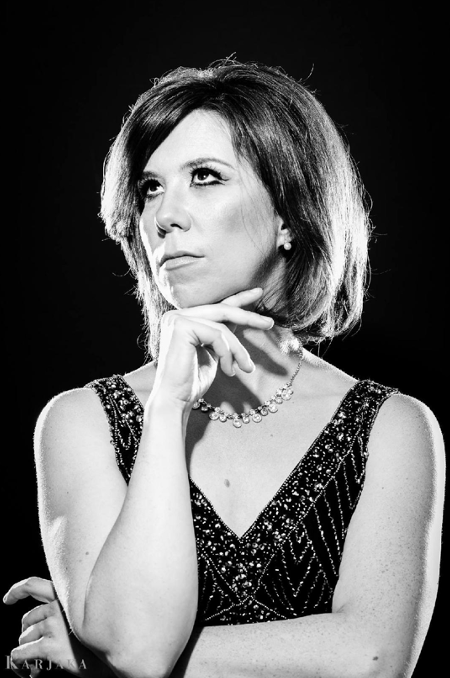
Jessica Xylina Osborne, Pianist
Jessica Xylina Osborne, a native of San Antonio, Texas, has been playing the piano since she was four years old. She comes from a musical family: her mother, an accomplished pianist herself, was Jessica’s first teacher. Her mother’s father was a self-taught bluegrass guitarist, and his father played the piano as background music for silent movies.
Jessica has enjoyed an illustrious and diverse career in music. She pursues ambitious projects that reflect creativity in programming with the goal of bringing attention to infrequently performed works. She enjoys presenting programs that pair well-known audience favorites with music being written today, in addition to programming works written by composers who have historically been overlooked within the classical music canon.
Jessica has regularly performed with some of the classical music world’s biggest stars, including Hilary Hahn, Ani Kavafian, and Timothy Eddy, among many others. In addition to performing at some of the world’s top concert halls, including Carnegie Hall, the Seoul Arts Center, and the Kennedy Center, she has gotten to perform at many of the world’s most unique and interesting venues. Some of her favorites include the Walton Gardens in Ischia, Italy; the Louvre Museum in Paris; and the Folly Theater in Kansas City.
Jessica received her Bachelor of Music degree in piano performance from the Juilliard School and Indiana University Jacobs School of Music; her Master of Music degree from Rice University; and her Doctorate of Musical Arts from Yale University. Her teachers and mentors include her mother Patricia Osborne, Dr. Marjorie Lee, Seymour Lipkin, Emile Naoumoff, Jon Kimura Parker, and Claude Frank.
In her spare time, Jessica loves reading, yoga, playing with her two very energetic cats, and learning foreign languages.



